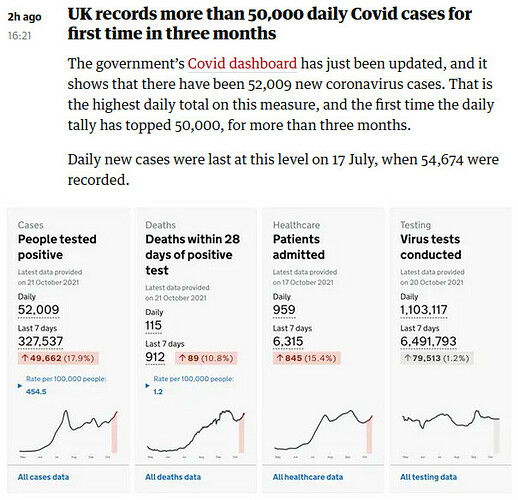Watching Stand up to cancer the other evening, forgetting the production quality, they referenced that 1.in 2 people will be effected by cancer, that put the little covid infection into perspective.
I don’t think just wearing a mask can prevent most cancers - but it sure makes a difference to Covid.
Oh I don’t doubt that it’s on the media - it’s just that I can’t find the figures they’re using. Projections forward maybe? Or local/regional black spots?
I noticed that Morocco had banned flights from the UK yesterday - if the UK (or rather English) government doesn’t act soon we’ll be back to travel restrictions with it.
Agree. Perhaps then the government will do something.
Or perhaps they don’t mind that the general public won’t be able to travel - after all it is unlikely to affect ministers.
Someone should stand up in Parliament and tell BoJo straight that the UK doesn’t want another of his world beating efforts, they just want something that is efficient and cost effective and works for the UK
Perhaps even, administered regionally where, surprise surprise, people know what is going on their area.
…we go to UK on Sunday to see 3month old grandson and have a bit of concern the given UK rate is about x10 of here Macron might re introduce entry restrictions from UK.
Congratulations Grandad!
I don’t think France or the EU would stop their own residents coming back in, do you? More likely to curtail visits, or just bring back more stringent vaccination/test requirements.
I agree, Geof. Even in the first full wave of Covid when no-one was allowed anywhere apart from special cases, residents could come home @strudball , if I remember rightly. The problem then was that the ferries had stopped running! Not sure if the tunnel still worked though…
I belleve Newhaven-Dieppe ran a reasonable servicr throughout. I believe on that service passrngers are mostly just decoration as primarily a freight route.
It is beyond belief that following the damning report of a few weeks ago, this government is falling into exactly the same trap.
They must all have dementia if their short term memory is so bad.
No, it’s not, because all around the world populist governments are consistently having problems dealing with Covid because they refuse to implement controls that they consider ideologically undesirable or potentially socially unpopular.
For me the most ludicruous example is in Russia, where Putin has spent the last year hiding from Covid and implementing all sorts of other restrictions such as those on political activity, yet has until today refrained from any forms of social restrictions to deal with their Covid epidemic. Of course a further irony is that no matter how effective the Russian vaccine might actually be, the citizens are so distrustful of their government that they’re reluctant to take it.
Time and time again, in many different contexts, I ask myself what use is Russia?
They should trust the Russian vaccine as they stole it from Oxford AZ.
Apparently not! Looks like herd immunity could be a myth. Pasting New Scientist article as behind a paywall
Nearly everyone in Iran has been infected by the coronavirus at some point during the covid-19 pandemic, and some have caught the virus more than once, but the country still hasn’t achieved herd immunity. Instead, Iran is seeing a punishing new wave of deaths driven by the [delta variant.
Iran was one of the first countries after China to be hit by the pandemic, and it had a slow start to its vaccine roll-out. By July 2021, only about 3 per cent of the population was fully vaccinated against the coronavirus, according to the University of Oxford, although information from Johns Hopkins University in Maryland shows that proportion has now risen to about 23 per cent.
Understanding the effects of covid-19 in Iran has been made more difficult by limited official data. Iran’s Ministry of Health and Medical Education stopped releasing province-level data on confirmed cases and deaths in March 2020. Ghafari also says that low and middle-income countries are more likely to under-report cases and deaths due to a lack of health infrastructure and testing capacity.
To get round the shortfall in information, Ghafari and his colleagues analysed figures from Iran’s National Organization for Civil Registration (NOCR) on how many deaths there were from all causes in the first nine months of 2020. They compared these with historical data to see how many more deaths there were than usual. The researchers used this excess deaths figure as a proxy to estimate the number of covid-19 deaths and population-level exposure to the virus – an approach that has proved accurate in the UK and South Africa.
The NOCR began releasing past weekly data stratified by age group in August, which allowed the researchers to reconstruct the dynamics of the pandemic in Iran from January 2020 through to September 2021.
They calculated how many people in each province had contracted covid-19 using known global figures on the percentage of infected people who die, known as the infection fatality rate (IFR) for each age group. Dividing the number of excess deaths by the IFR gives an estimate for the number of infections, and allows you to tell what proportion of the population is infected, also known as the viral attack rate.
The analysis showed that the total infected population was probably very high in many provinces. Eleven of them had rates over 100 per cent as of 17 September. The highest rates were seen in Sistan and Baluchestan province, which had an estimated attack rate of 259 per cent. If accurate, that would mean most people have had the virus twice and some for a third time. The researchers conclude that herd immunity through natural infection hasn’t been attained in Iran in spite of widespread exposure to the SARS-CoV-2 virus, probably because of immunity waning over time, susceptibility to new variants of concern like delta or a combination of the two.
McMaster University in Canada says studies using direct measurements of infections are needed to conclusively determine the attack rate of the virus for a given population. However, he finds the study’s conclusions plausible. “Overall, what’s happening globally is that it certainly does appear that antibodies wane and there’s not this point where, miraculously, herd immunity or herd effect is achieved,” he says.
Loeb says he isn’t aware of any pathogens for which herd immunity has been reached without vaccination. “By far the safest and most effective way to achieve herd immunity is through vaccination,” he says.
The first strong indication that herd immunity against covid-19 can’t be achieved without vaccination came from Manaus in Brazil. In October 2020 a study of blood donors showed that 76 per cent of the population had been infected with the coronavirus, which was above the theoretical herd immunity threshold of 67 per cent for that community. That threshold is based on limiting the average number of other people an infected person is likely to go on to infect – [the R number] to three. In December and January, Manaus saw an alarming surge ) in cases, hospitalisations and deaths, which was attributed to the highly transmissible gamma variant.
Evidence is piling up that the immunity conferred by infection wanes. A recent study of SARS-CoV-2 and related coronaviruses found that reinfection by SARS-CoV-2 occurred in about 16 months, less than half the time it takes for endemic “common cold” coronaviruses. And a study in India found a covid-19 reinfection rate of 27 per cent during the surge caused by the delta variant earlier this year.
David Fisman at the University of Toronto in Canada says, “Iran is a big and complicated place and I think the work [these researchers] have done has substantial face validity.” However, he says the study’s conclusions rest on two big assumptions: that all excess mortality is due to covid-19, and that the IFR estimates can be applied to Iran. He says if the IFR values aren’t the same there, because of overwhelmed health systems or a new, deadlier viral variant, the calculated attack rate would then also be inaccurate.
The analysis is consistent with previous studies showing that immunity to covid-19 fades and new variants aren’t stopped as effectively by immune defences, says Queen Mary University of London. “There is no country so far, 19 months into the pandemic, that has reached herd immunity. And by that I mean, the point at which you lift all restrictions and the pandemic will actually die out because there’s nobody left to infect.”
Read more: Covid-19: Nearly everyone in Iran seems to have been infected at least once | New Scientist
We’re doomed all doomed.
I read and listened to a couple of experts saying similar. Whilst we in the UK suffer, hopefully more intelligent governments can change the direction their countries take.
Thanks for the article.
Thanks for the article Jane. I find the view in the last paragraph strange. We have never reached a situation with flu where “there’s nobody left to infect”. Yet society has learnt to “live with flu” albeit significant numbers die from it in bad winters.
Surely all that is going to happen is that we are going to learn to “live with Covid”?
Apparently the effects of the Pfizer booster are quite spectacular, so if the kids are still refusing to get vaccinated and those older do not take up the offer of the booster, then that those that do should be OK.
This is my fear:
My daughter and mother-in-law are already booked to stay with us here over Xmas and NewYear.
I just wish the UK would act now with some modest measures, rather than a more draconian clampdown later.

